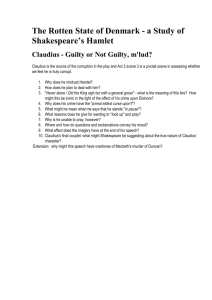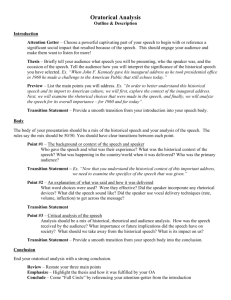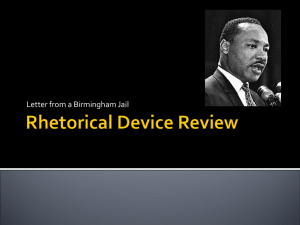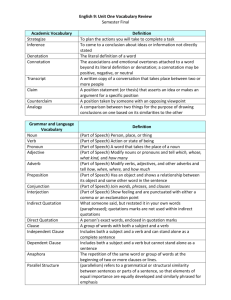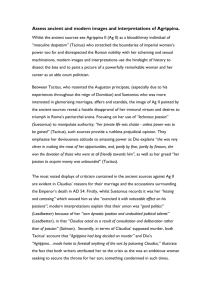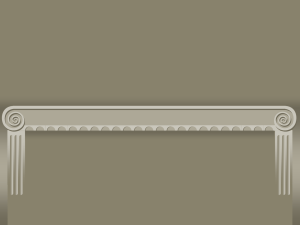Rhetorical Analysis of Claudius` Speech Act I
advertisement
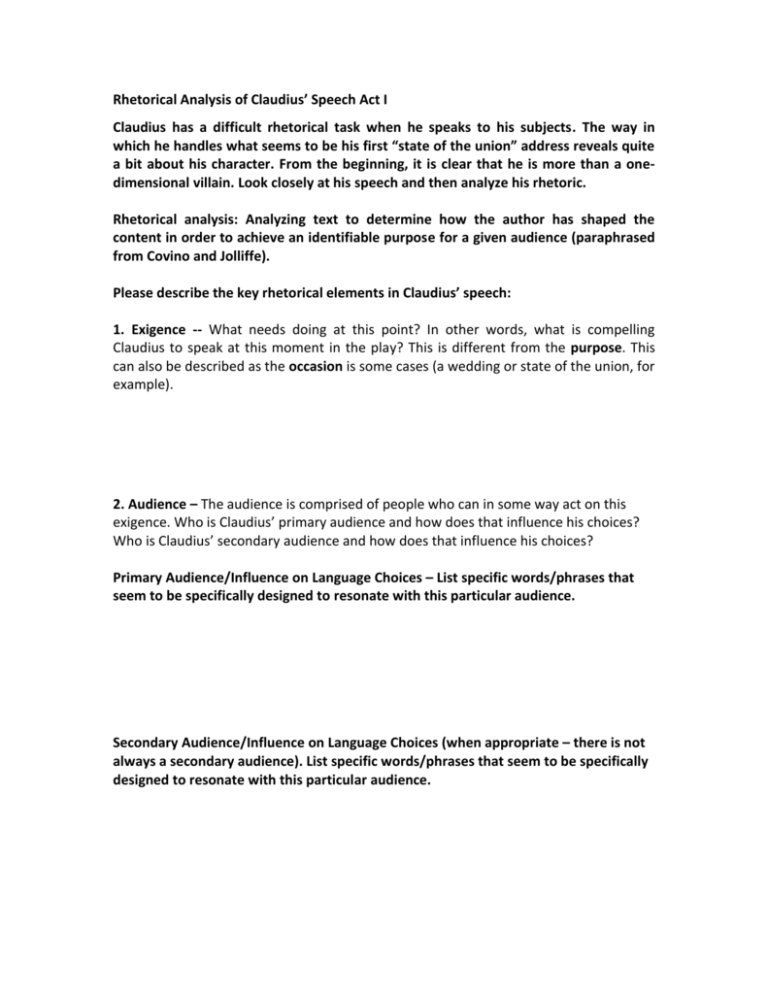
Rhetorical Analysis of Claudius’ Speech Act I Claudius has a difficult rhetorical task when he speaks to his subjects. The way in which he handles what seems to be his first “state of the union” address reveals quite a bit about his character. From the beginning, it is clear that he is more than a onedimensional villain. Look closely at his speech and then analyze his rhetoric. Rhetorical analysis: Analyzing text to determine how the author has shaped the content in order to achieve an identifiable purpose for a given audience (paraphrased from Covino and Jolliffe). Please describe the key rhetorical elements in Claudius’ speech: 1. Exigence -- What needs doing at this point? In other words, what is compelling Claudius to speak at this moment in the play? This is different from the purpose. This can also be described as the occasion is some cases (a wedding or state of the union, for example). 2. Audience – The audience is comprised of people who can in some way act on this exigence. Who is Claudius’ primary audience and how does that influence his choices? Who is Claudius’ secondary audience and how does that influence his choices? Primary Audience/Influence on Language Choices – List specific words/phrases that seem to be specifically designed to resonate with this particular audience. Secondary Audience/Influence on Language Choices (when appropriate – there is not always a secondary audience). List specific words/phrases that seem to be specifically designed to resonate with this particular audience. 3. Purpose What is the purpose of Claudius’ speech? To explain? To inform? To anger? Persuade? Amuse? Motivate? Sadden? In other words, what does Claudius intend for the audience to do or think after his speech has been delivered? 4. Appeals: Which appeal(s) does Claudius use to convince and/or motivate his audience? Reference specific lines as well as the appeal. Ethos: Appeal to the character of the speaker (or persona) Pathos: Appeal to the emotions or interest of the audience Logos: Appeal to the structure of the argument (logic) 5. Figures of speech, imagery, diction, syntax: What literary devices does Claudius employ? Where do you see the speaker making comparisons? How do these comparisons relate to the speaker’s rhetorical purpose? What particularly vivid images stand out? What effect do these images have on the speaker's rhetorical purpose? KING CLAUDIUS Though yet of Hamlet our dear brother's death The memory be green, and that it us befitted To bear our hearts in grief and our whole kingdom To be contracted in one brow of woe, Yet so far hath discretion fought with nature That we with wisest sorrow think on him, Together with remembrance of ourselves. Therefore our sometime sister, now our queen, The imperial jointress to this warlike state, Have we, as 'twere with a defeated joy,-With an auspicious and a dropping eye, With mirth in funeral and with dirge in marriage, In equal scale weighing delight and dole,-Taken to wife: nor have we herein barr'd Your better wisdoms, which have freely gone With this affair along. For all, our thanks. Now follows, that you know, young Fortinbras, Holding a weak supposal of our worth, Or thinking by our late dear brother's death Our state to be disjoint and out of frame, Colleagued with the dream of his advantage, He hath not fail'd to pester us with message, Importing the surrender of those lands Lost by his father, with all bonds of law, To our most valiant brother. So much for him. Now for ourself and for this time of meeting: Thus much the business is: we have here writ To Norway, uncle of young Fortinbras,-Who, impotent and bed-rid, scarcely hears Of this his nephew's purpose,--to suppress His further gait herein; in that the levies, The lists and full proportions, are all made Out of his subject: and we here dispatch You, good Cornelius, and you, Voltimand, For bearers of this greeting to old Norway; Giving to you no further personal power To business with the king, more than the scope Of these delated articles allow. Farewell, and let your haste commend your duty. NOTES
